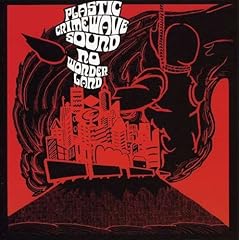
"Death in the computer age has beget the Internet wake: teary, funeral parlor eulogies splayed across message boards, long-time chums and one-time companions expressing their perfectly formatted grief with a quick “submit.”
When Nikki Sudden passed away unexpectedly in March of 2006, I found myself perusing various fan sites, Sudden’s infinite number of collaborators and cohorts—most of whom had never met in person—comforting one another with disjointed, yet earnest, epistles honoring the singer-songwriter’s solo years, as well as his work with Swell Maps and the Jacobites. My favorite came from Phil Shoenfelt, member of the post-punk outfit Southern Cross. Shoenfelt wrote of an unusual recording session with Sudden (born Adrian Nicholas Godfrey) atop a Moravian mountain, the secluded studio located in the back room of a pub. Shoenfelt’s green Skoda conked out a kilometer short of the studio, forcing folks to lug gear the rest of the distance—merely adding to the sense of lunacy that typically harried any recording session involving Sudden.
Shoenfelt’s memory remains with me because it could have detailed the recording of
Jane from Occupied Europe, an album by Sudden’s Swell Maps. Bandmates cloistered atop a mountain peak, battling one another and the itchy agitation that comes with cabin fever, dabbling in the practice of bricolage to both survive and work (gathering whatever one finds for fuel and food, taping whatever one hears to four-track), writing bustling pop-punk tracks by day, claustrophobic lunacy by night—it’s imagery that gambols through my mind whenever I give this work of sonic bedlam a listen.
Sudden and his brother, Epic Soundtracks (born Kevin Paul Godfrey), founded Swell Maps in 1972. Its primary function? To conquer West Midlands boredom with titillating noise. As Sudden sang in “Green Shield Stamps” years later, “Dave [Barrington], Epic, and I got together a band or two / Recorded in our bedrooms / What else were we gonna do?”
Swell Maps were DIY disciples from the onset, kicking at the chins of bravura by employing anything (books) and everything (boxes) as percussion. Little changed when the band became more purposeful. The first single, “Read About Seymour,” was self-produced and self-released in January of 1978 on the band’s Rather Records. Checking in at 86 seconds short, the crunchy punk track exhibited true amateur panache. Naturally, it caused Rough Trade shop owner Geoff Travis to come sniffing; the group’s ensuing three singles and two albums would be issued on the label.
Jane from Occupied Europe was the last of these releases (hitting racks in August of 1980), an exhausting, bipolar, and voluminous swan song for a blink-and-it’s-gone pop career. It’s chaos committed to tape, when quite honestly, it’s the
band that should have been committed. One imagines Sudden, Soundtracks, and crew expelling an enormous, chest-sinking sigh when production was finished; the listener is compelled to do the same.
Years later, teenagers named Stephen Malkmus and Scott Kannberg were two such listeners, falling under the sway of Swell Maps’ half-caste sound, which slovenly combined the alien hypnotism of Can with the snarly, animalistic rock of T. Rex. Later, as members of Pavement, the pair released the EP
Slay Tracks (1933-1969) and paid tribute to their fractured, lo-fi heroes by adopting their own pseudonyms: Malkmus as S.M., Kannberg as Spiral Stairs.
Sonic Youth’s Thurston Moore was also an ardent fan, once claiming, “Swell Maps had a lot to do with my upbringing.” The band’s incendiary pop-noise blend was later crafted into something more dynamic in his hands. Dinosaur Jr., R.E.M., and Evan Dando (who later struck up a working relationship and friendship with Epic Soundtracks) were on board, as well.
Honestly, it’s remarkable
Jane from Occupied Europe inspired anyone. Anarchic records always implement some form of pop conscription, giving a band its own army of committed grunts. Swell Maps were anarchic, sure—they were also abrasive, invading, and panoptic, ever shifting and transforming. Listeners typically came away with a warm sense of accomplishment rather than prickly tingles of inspiration.
The album’s first side features a string of punk and post-punk numbers: the No-Wave inspired “Let’s Buy a Bridge,” where Sudden sounds simply Dylanesque; “Border Country” and its saloon piano; the three-chord rocker “Cake Shop” with its brilliant, out-of-place synth melody; and “The Helicopter Spies,” which shows Swell Maps could spit out great punk ditties when it wanted. Of course, doing so meant being toe-tagged with a genre, a very notion the band disliked. Thus, we have the music that follows.
“Big Maz in the Desert” flirts with industrial; Swell Maps were interested in the urban brutality (they did grow up outside Birmingham, after all) often depicted in this music, but were never willing to fully cross over to the world of tape loops and processing. Tracks such as “Big Empty Field” and the opener, “Robot Factory,” meanwhile, can be classified as mechanized ambient—music Brian Eno would have crafted had he been kidnapped and forced to toil in a Ward End automobile plant, grease staining his pastel feather boa.
The album wraps up with the minimalist “Raining in the Room,” a reverb-drenched number replete with nostalgia-inducing piano. It’s an ode to Sudden and Soundtrack’s pre-Swell Maps days: writing originals because they couldn’t play anything by anyone else, recording in their bedroom on reel-to-reel, thinking a pop career was impossible on account of their lack of quid for studio time and lack of general music acumen.
Swell Maps yearned to be different, but in neither a calculated nor pretentious way. Being grandiloquent meant you were full of shit. As a result, Swell Maps produced music both ahead and outside of its time."
Whooooaaaaaa. This band is insane. Just when you think they're about to go off on some poppy, Damned-esque punk tune then BLAM! Let's do something weird with it. This has been dominating my soul lately which is good cause it's cold and bleak outside and this keeps some pep in my step. Blah blah blah. Get yer kicks.
Boy, that's a swell map

















